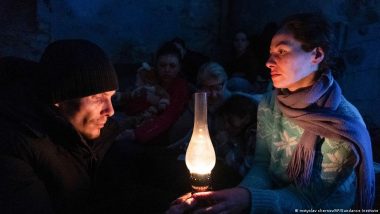DW met Pulitzer Prize-winning war reporter Mstyslav Chernov, whose film on Russian atrocities has won Ukraine's first Academy Award.A pregnant woman is carried away on a stretcher after a Russian missile strike on a maternity hospital: This shocking image from the Siege of Mariupol traveled around the world.
Also Read | India News | PM Modi Inaugurates, Lays Foundation Stone for 112 National Highway Projects.
The reason it exists in the first place is thanks to the Ukrainian war correspondents working for the Associated Press, who remained in the city when it was encircled and extensively bombed by Russian troops.
They were the last team of international journalists on site, covering the first 20 days of the siege that left the city in ruins.
The Ukrainian reporters Mstyslav Chernov, Evgeniy Maloletka, Vasilisa Stepanenko and Lori Hinnant won the Pulitzer Prize for Public Service for their work, as well as many other awards — including the Deutsche Well Freedom of Speech Award.
Ukraine's submission to the Oscars
Mstyslav Chernov then turned his video footage into a film, titled "20 days in Mariupol."
The documentary has now won the best documentary Oscar at the Academy Awards in Los Angeles.
The film, which has also won the World Cinema documentary prize following its Sundance premiere, celebrated its German premiere at Berlin's Human Rights Film Festival, where DW met the filmmaker.
The documentary goes way beyond the news stories using the Associated Press material that was widely broadcast around the world.
"That was one of the main reasons why this film needed to be made," says Chernov. "The impressions you get from one-minute to two-minute news pieces is very different to what you feel and what you understand when you watch 95 minutes," which, he says, is still "not enough to speak about all the tragedies that happened in Mariupol — even the 30 hours [of video footage] that I managed to get out from the city is not enough."
A modern city destroyed by Russia
The estimated number of Ukrainians killed in besieged Mariupol varies greatly; the film cites the Ukrainian count of more than 25,000 deaths.
According to UN estimates, 90% of the city's apartment buildings and 60% of single-family homes were damaged.
Meanwhile, Russia is knocking down those destroyed buildings, and is building new ones "just to make good pictures," says Chernov, thereby erasing the locations that could help determine the scale of the war crimes committed by Russia. "There is less and less evidence left with every every single day that passes by."
A war built on lies
"20 Day in Mariupol" portrays not only from the inside how a modern European city was bombed to ruins, how children fell victim to the missiles and how mass graves had to be created to bury thousands of bodies, but also provides a reminder of how Russia framed the events.
At the beginning of the film, Vladimir Putin is shown stating in a televised speech at the launch of the invasion that his "special military operation" is absolutely necessary, because otherwise Russia would be attacked first. As one Mariupol resident puts it sarcastically in the film, the Russian leader was "beautifully, so beautifully" deceptive in his speech.
This reminder that the whole conflict is based on Putin's lies makes the images of its bloody impact even more painful to watch.
As the medical team in the hospital where the Associated Press journalists were based desperately tried to revive a toddler badly wounded by Russian shells, or operate a teenager whose legs were blown off while playing soccer, the head surgeon encourages Chernov to film every gory detail: "Show that Putin bastard the eyes of this child!" he yells. "Show what these motherf**kers are doing to civilians!"
As Chernov states in the film's narration: "This is painful to watch but it must be painful to watch."
A portrayal of global 'information wars'
The Ukrainian reporters managed to send their reports to Western media at the risk of their lives, as they often had to reach uncovered spots where WiFi might still be available.
But Russia was quick to label the images as "fake news."
As they were released, the Russian Embassy in London tweeted that that the pregnant woman shown in the AP photos was an actress. The documentary also shows a clip of a British journalist confronting the Kremlin's ambassador to the United Nations, Vasily Nebenzya, with Chernov's footage; the diplomat brushes off the question about the killing of babies as "information wars."
"It's impossible to tell the story of Mariupol completely without telling how much misinformation and misinterpretation is connected to it," Chernov tells DW.
As we discuss the topic of war reporting, the filmmaker however stresses that his film is not about journalists: "It's the story of my people, who were trapped, killed, lost their homes," says the director who was born in Kharkiv, another border city that was hard hit by the Russians.
Nevertheless, "20 Days in Mariupol" also chronicles a modern-age phenomenon that is harming the work of journalists globally, as fake news is contaminating the coverage of all contested issues — as is currently the case in the war between terrorist group Hamas and Israel.
Ukraine's fight continues as the world's attention shifts
Asked if he's worried that the world will forget the Ukrainians amid the Israel-Hamas war, the reporter realistically points out: "The shifting of the media's attention was inevitable. We work in the news. We know that attention shifts and comes back later." Chernov is also well aware that both conflicts are geopolitically connected.
But, he adds, some parts of European society are mistaken in their belief that if only weapons were no longer delivered to Ukraine, war would stop and peace negotiations would happen: "I don't think that a shift in international support for Ukraine will stop the fight. Ukrainians are fighting for their survival. So it just means that more Ukrainians will die, because nobody will watch, nobody will help."
This article, first published during the Berlin Human Rights Film Festival on October 26, 2023, was updated following the documentary's Oscar win on March 11, 2024.
Edited by: Brenda Haas
(The above story first appeared on LatestLY on Mar 11, 2024 02:20 PM IST. For more news and updates on politics, world, sports, entertainment and lifestyle, log on to our website latestly.com).













 Quickly
Quickly





















